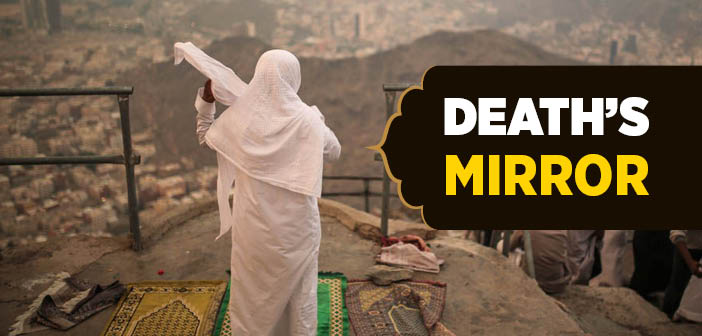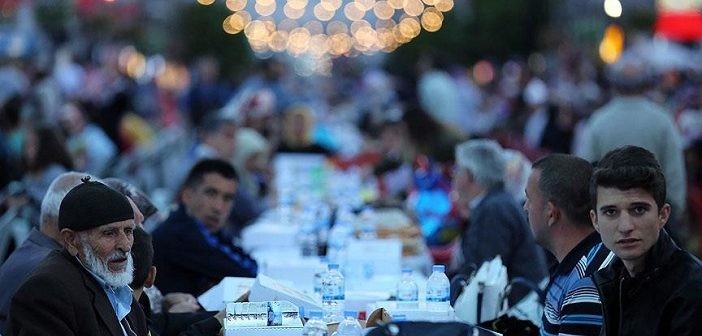
For Soundness of Belief at the Last Breath
What is the last breath in islam? What is the soundness of belief?
When the human being receives a worldly diploma, that diploma remains valid throughout their life. But this is not the case with the spiritual life. There is no such guarantee there. On the contrary, there is always the danger of losing one's spiritual state or belief at any moment. Indeed, the Qur'an relates the stories of those, like Bal’am bin Ba'ura' and Qarun, who went astray in the last stages of their lives.
Qarun was once a righteous slave of Allah, among the best commentators of the Torah. He was later tested by Allah almighty with wealth. Driven to self-conceit due to his riches and material strength, he took a stance against Prophet Musa (peace be upon him). This pride and conceit led to his own ruin.[1]
Also having lived during the time of Prophet Musa, Bal’am bin Ba'ura',[2] too, fell prey to his vain desires and thus ruined his Next Life.
[1] "Recite to them the tale of him whom We gave Our Signs, but who then cast them to one side and shaytan caught up with him. He was one of those lured into error." (Al-A'raf, 7:175)
Qur'anic exegetes have indicated that the person mentioned in this verse is indeed Bal’am bin Ba'ura'. While having believed in Prophet Musa initially, he went astray in exchange for petty worldly interests.
Only the Prophet s and those that the Prophet s themselves have explicitly confirmed have any guarantee when it comes to departing from this world with sound belief in their hearts.
For this reason, the heart of a believer:
üNeeds to constantly oscillate between the two realities of hope and fear throughout their entire life, in a perpetual state of vigilance.
üNeeds to strive to understand the wisdom behind the Qur'anic verse: "And (continue to) worship your Lord until what is certain (death) comes to you."
üMust spend in the effort of translating the Qur'an and the prophetic way into action at every breath, reciting repeatedly and wholeheartedly the supplication of Prophet Yusuf: "My Lord ... Take me to back to You as a Muslim at my death and join me to the people who are righteous." (Yusuf, 12:101)
üIt should not be forgotten that the most important diploma to be earned in this world of trial is the testimony of belief at one's last breath.
The following example vividly illustrates the importance of spiritual vigilance until this appointed time:
Friend of Allah, Sufyan Ath-Thawri, was bent double in humility at a very young age. To those who enquired about the reason, he used to say:
"I had a teacher from whom I received instruction. During his death, he could not recite the declaration of Belief despite my frequent prompting for him to do so. Seeing him in such a state caused me to become thus."
The last breath is the most critical and difficult moment in one's life. All a person's worldly thoughts, dreams and plans are upset and upturned at this moment and they are in a state of utter confusion and disarray. It is declared in a Qur'anic verse:
"The throes of death come revealing the truth. That is what you were trying to evade!” (Qaf, 50:19)
'A'isha (may Allah be well pleased with her) relates:
"(Nearing the time of his death,) There was a vessel or a container containing some water in front of the Messenger of Allah (may Allah bless him and grant him peace) and he put his hands in the water and wipe his face with them, saying, 'There is no god but Allah. Death has its agonies.'" (Bukhari, Riqaq 42, Maghazi 83)
It is therefore imperative that one prepare for this most difficult moment, so that they can affirm the words of the shahadah (declaration of belief) at the last breath. For it is no easy thing for a person in whose heart belief has not taken root, who has not led a life in accordance with the Qur'an and the Sunna, whose tongue has not become accustomed to remembrance of Allah, to utter the Declaration of Faith at that gruelling moment.
'Umar (may Allah be well pleased with him) once saw Talha in a state of sorrow. When he asked him why he was in such a state, Talha (may Allah be well pleased with him) said:
"The Messenger of Allah (may Allah bless him and grant him peace) once said:
'I know a word the invocation of which at the time of death will assuredly be a light for the dying person's book of deeds and with it their body and spirit will attain Divine approval, mercy and repose at the moment of their death.' The Messenger of Allah (may Allah bless him and grant him peace) passed away before I was able to ask him what this word was. This is what grieves me."
Upon this, 'Umar (may Allah be well pleased with him) said:
"I know that word. It is the statement, 'There is no god but Allah' (Lā ilāha illāllah), which the Messenger of Allah wished that his uncle, Abu Talib had said. If the Messenger of Allah (may Allah bless him and grant him peace) had known of a word better than this, he would certainly have desired for him to have uttered that instead." (Ibn Majah, Adab, 54. See also Ahmad, I, 6)
For the Messenger of Allah (may Allah bless him and grant him peace) said:
"He whose last words are: 'Lā ilāha illāllah' (There is no god but Allah) will enter The Garden."[3]
According to the scholars, that which is implied in this saying means the statement, "Lā ilāha illāllah", and its inseparable addition, "Muḥammadun rasūlullah." Both, ‘there is no god but Allah’ and ‘Muhammad is the Messenger of Allah,’need to be recited together. Some narrations mention only the statement, "Lā ilāha illāllah", while both statements are implied. This is because, legally speaking, the words "Lā ilāha illāllah" have been taken to signify both clauses of the Declaration.[4]
The Declaration of Faith become imprinted on the heart of a person as a consequence of a life lead in agreement with it. If the slave is neglectful, deficient or completely indifferent towards the Divine commands and prohibitions, a great chasm is created between them and this sublime Declaration of Faith. This chasm only deepens and continues to do so as long as they fail to turn away from their heedlessness back to Allah asking for his forgiveness. In the end, its only remaining connection with the slave becomes an empty assertion that goes nothing beyond mere vocal expression and utterance and this amounts to absolute ruin.
Allah Almighty declares:
"Do people imagine that they will be left to say, ‘We believe,’ and will not be tested? We tested those before them so that Allah would know the truthful and the liars." (Al-Ankabut, 29:2-3)
When Wahb ibn Munabbih (may Allah have mercy on him) was asked:
“Is not the invoking of, "Lā ilāha illāllah" (There is no god but Allah), the key to the Garden?" he replied:
"Indeed, but certainly every key has its teeth. If you bring a key that has teeth, the door shall open for you; otherwise, it will not." (Bukhari, Jana'iz, 1)
Likewise, Imam Zuhri, the great scholar from the generation of the Successors (may Allah be pleased with him) was once asked concerning the Prophetic narration, "Whoever says ‘Lā ilāha illāllah’ will enter the Garden." He replied:
"This was only in the early days of Islam, before the revelation of the Divine commands and prohibitions." (Tirmidhi, Iman, 17/2638)
That is to say, with the completion of the Deen (way of life), fulfilling all the rules, commandments and injunctions of the Qur'an and the Sunna became mandatory. In this respect, it is essential, for our eternal happiness in the Next World that every moment of our worldly lives be in line with the profession of belief.
Negligence and deeds of wrongdoing more often than not become obstacles to professing one's belief at the last breath. One of the stories related in relation to this is the following:
A man who used to strive to weigh with a true, accurate balance was in his death throes. When he was prompted to say, Lā ilāha illāllah, he managed to say it with great difficulty:
"Pray that Allah make it easy for me to recite the Profession of Faith. The tongue of the scales is weighing down on my own tongue and preventing me from professing my belief. For I never used to wipe the small amount of dust remaining on the scales and would never clean the dust and dirt that accumulated on them due to the wind."[5]
Muhammad Ma'sum al-Faruqi says:
"The fear of the last breath is a blessing by which all Friends of Allah have been affected."
A believer who carries this feeling in their heart leads his worldly life with meticulous caution, as though they were walking through a minefield. They yield wholeheartedly to the silent counsel of the graveyards, that their last stop in this world be a garden of the Garden. They come to the realisation that preparation for death is not so much preparing the grave for themselves, but preparing themselves for the grave.
It is recorded that Ahmad Harb had an elderly Zoroastrian neighbour; whose name was Bahram. Ahmad Harb once invited his neighbour to accept Islam, upon which the elderly Bahram replied:
"Let me put to you three questions. If you can answer all of these, I will accept Islam."
Ahmad agreed, so Bahram asked:
"Why did Allah create human beings? Having created them and providing their sustenance, why does He cause them to die? And having caused them to die, why does He raise them up again?"
Ahmad replied:
"He created them to serve Him, realising His existence and Oneness and coming to perceive the manifestations of His power and majesty.
He provided them so they might know Him to be the All-Providing and All-Merciful.
He causes them to die that they might know His All-Overwhelming power.
He raises them back to life again to make them know Him as the All-Permanent, absolutely All-Powerful One Who has full knowledge of and power over all things."
After a moment of reflection upon hearing this response, Bahram professed his belief. But Ahmad Harb fainted. When he regained consciousness, they asked him why he fainted, to which he replied:
"The very moment [when Bahram recited the Declaration of Faith], a voice from within called out to me saying: 'Bahram was a Zoroastrian for seventy years and now he has believed. You, however, have spent seventy years in belief; do you know what will befall you at your last breath?"[6]
Therefore, we must ensure that every breath we take will render the last moment of our worldly life a propitious one. In addition, we must not rely upon our good deeds and steadfastness, instead seeking refuge in Divine mercy and forgiveness for the sake of our eternal salvation.
As is stated in a prophetic narration:
"Verily, a person performs the deeds of the people of the Garden for a long time. Then his deeds are transformed into the deeds of the people of the Fire and, truly, a person performs deeds like the people of the Fire for a long time, and then his deeds are transformed into the deeds of the people of the Garden." (Muslim, Qadar, 11)
'Uthman (may Allah be well pleased with him) said:
The true believer possesses six different kinds of fear:
- Fear of losing their belief;
- Fear of the Recording Angels having written something that will be the cause of their disgrace on the Day of Reckoning;
- The fear that the accursed Satan will bring their deeds to naught;
- The fear that the Angel of Death will come to them at a time of heedlessness and catch them unawares;
- The fear of being caught up in distractions such as family and children that might divert them from remembrance of Allah and the mentioning of His Names; and
- The fear of being tempted by this world and remaining heedless of the Next World.
Thus, by teaching us the following supplication, our Lord reveals the way in which we need to turn to Him:
'Our Lord, do make our hearts swerve aside after You have guided us. And give us mercy directly from You. You are the Ever-Giving' The Family of Imran (Al ’Imran, 3:8)
The Messenger of Allah (may Allah bless him and grant him peace) would frequently recite the following supplication:
Ya muqallib al-qulub, thabbit qalbi 'ala dinik.
"O Overturner of Hearts! Make my heart firm upon Your Religion."
Moreover, when Anas ibn Malik (may Allah be well pleased with him) once asked him:
"O Messenger of Allah, we believe in you and what you have come with, but is it that you fear for our belief?" The Messenger of Allah (may Allah bless him and grant him peace) replied:
"Yes. Indeed, hearts are between the two Fingers of the All-Merciful; He changes them as He wills." (Tirmidhi, Qadar, 7/2140)
Another point is that the believer must always think the best of their Lord. On this, Jabir ibn Abdullah (may Allah be well pleased with him) relates:
"I heard the Messenger of Allah (may Allah bless him and grant him peace) saying three days before his death:
'None of you should except with a good opinion of Allah, the Exalted and Glorious.'" (Muslim, Janna, 82; Abu Dawud, Jana'iz, 12-13/3113)
As stated in a Sacred Tradition (hadith Qudsi),
"I am in My slaves opinion of Me. I am with him wherever he is and whenever he makes mention of Me." (Bukhari, Tawhid, 15, 35; Muslim, Tawba, 1.)
Thinking well of Allah is to attract His compassion and kindness, never to despair of His infinite mercy, hoping for His forgiveness, and having unwavering confidence and belief in the attainment of such happiness.
But for this to happen, a person needs to possess pure belief and right action. The joining together of belief and good deeds in so many verses of the Qur'an points to their mutual interdependence.
And so, a person who hopes for good and mercy from Allah and who strives to fulfil all their obligations, will find Allah just as they have thought of Him. One who expects otherwise, will find Him to be otherwise.
Let us conclude this discussion with the earnest entreaty of Abu Bakr (may Allah be well pleased with him):
"O Allah, make the best part of my life its end, the best part of my deeds their results and the best of my days the day in which I am reunited with You!"[7]
Amin.
[1] See (28:76-82).
[3] Abu Dawud, Jana'iz, 15-16/3116; Ahmad, V, 247; Hakim, I, 503, cf. Bukhari, Jana'iz, 1.
[4] al-'Azim Abadi, 'Awn al-Ma'bud, Beirut 1415, VIII, 267-268.
[5] İmâm Şârânî, Ölüm Kıyâmet Âhiret, Bedir Yayınları, p. 48.
[6] Tazkirat al-Awliya, p. 97.
[7] al-Suyuti, Tarikh al-Khulafa', p.103.
Source: Osman Nuri Topbaş , Journey To Eternity, Erkam Publications
Dying as Muslims

Death’s Mirror













